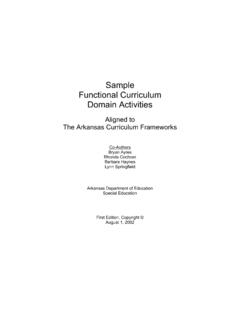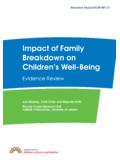Transcription of Special Education Process Guide
1 Special Education Process Guide Arkansas Division of Elementary and Secondary Education , Special Education Unit October 25, 2021 Revision History ii Introduction The purpose of this document is to supplement the Arkansas Division of Elementary and Secondary Education ( DESE) Special Education and Related Services Procedural Requirements and Program Standards and DESE Special Education Eligibility Criteria and Program Guidelines for Children with Disabilities Ages 3-21. Individuals using this document will be guided through particular contexts in the Special Education Process . Each context provides a list of forms, an overview of the Process , and a walk-through of the forms used. Resources are provided where appropriate. For more information, please contact the Arkansas Division of Elementary and Secondary Education , Special Education Unit. Throughout the document, terms from the required Special Education forms will be noted in bold.
2 Specific directions will be noted in italics. When possible, the Procedural Requirements and Program Standards and the Eligibility Criteria and Program Guidelines are referenced with a notation of the regulation number in parentheses. The DESE Special Education Unit would like to express sincere gratitude to the Paperwork Reduction Task Force for all of their hard work and dedication to streamlining required Special Education forms and developing this Process Guide to support IEP teams in effectively using the new paperwork. Task Force Members: Dr. Rebecca Austin, Assistant Special Education Supervisor, Bryant Public Schools Bonnie Boaz, Coordinator, Arkansas transition Services Brigid Bright, Special Education Supervisor, Harrison Public Schools Lanna Bullington, Early Childhood Coordinator, Ozarks Unlimited Resources Becky Cezar, Former Administrator for Monitoring and Program Effectiveness, ADE-SEU Cindy Creasey, Teacher, Little Rock School District Rhonda Daniel, Special Education Supervisor, Southeast Educational Cooperative Yvonne Greene, Early Childhood Coordinator, ADE-SEU Lisa Haley, Associate Director, ADE-SEU Krista Harrell, Program Advisor, ADE-SEU Gretchen Hicks, Speech Language Pathologist, Easter Seals of Arkansas Vicki Holt, Special Education Supervisor, Conway Public Schools Cassie Howell, Attorney, Disability Rights Arkansas Karen Massey, Early Childhood Coordinator.
3 Southwest Educational Cooperative Melissa Moore, Special Education Supervisor, Cross County School District Marla Pearson, Special Programs Coordinator, Responsive Education Solutions Arkansas Courtney Salas-Ford, DESE Deputy General Counsel Rhonda Saunders, Administrator for Special Programs, ADE-SEU Melinda Smith, Special Education Supervisor, Little Rock School District Robin Stripling, Curriculum and Assessment Coordinator, ADE-SEU Cindy Weathers, Parent Angela Winfield, Former Special Education Supervisor, Southwest Educational Cooperative iii Table of Contents Initial Evaluation and Eligibility Process 1 The Referral and Evaluation Process Chart 2 Conduct Child Find Activities 3 Initial Evaluation Overview 4 Initial Evaluation Forms Step-by-Step Guidance 8 Record of Access 8 Special Education Referral 8 Notice of Conference 11 Referral Conference Decision 15 Existing Data Review 16 Notice of Action 20 Evaluation Programming Conference Forms Step-by-Step Guidance 25 Notice of Conference 26 Evaluation Programming Conference Decision Form/Notice of Decision 29 Specific Learning Disability Eligibility Determination 31 Individualized Education Program Process 36 Timeline Overview 37 IEP Meeting Overview 38 IEP Forms Step-by-Step Guidance 41 Notice of Conference 42 Notice of Conference, Flowchart A 45 Notice of Conference.
4 Flowchart B 46 Record of Access 47 Individualized Education Program 47 Parent Consent to Access Public Insurance and to Release Personally Identifiable Information 72 Notice of Action 74 Early Childhood Section 81 iv Secondary transition Section 92 Reevaluation Process and Eligibility Process 100 Reevaluation Flowchart 100 The Reevaluation Process Chart 101 Reevaluation Overview 102 Reevaluation Forms Step-by-Step Guidance 105 Notice of Conference 105 Existing Data Review/Notice of Decision 108 Notice of Action Parent Consent 111 Evaluation Programming Conference Decision Form/Notice of Decision 115 Specific Learning Disability Eligibility Determination 118 The Paperwork Reduction Task Force used the Oklahoma State Department of Education (OSDE) Special Education Process Guide as a model for the creation of this guidance document. The OSDE s exemplary work is greatly appreciated.
5 1 Initial Evaluation and Eligibility Process Prior to the initial determination that a child is a child with a disability, a full comprehensive and individual evaluation must be conducted in all areas related to the suspected disability of the child. This section describes the procedures and processes involved in conducting an initial evaluation and determining eligibility under IDEA for Special Education and related services. Throughout this Process , it is the responsibility of the Local Education Agency (LEA) to ensure that the parent(s) of a child are given the opportunity to fully participate. When conducting an initial evaluation, the following should be considered: If the child is a child with a disability; Whether the child needs Special Education and related services; The educational needs of the child; If the child is an English learner, the level of English proficiency, and The present levels of academic achievement and functional performance (related developmental needs) of the child.
6 3 Conduct Child Find Activities Each Local Educational Agency is responsible for ensuring that all children with disabilities from birth to twenty-one (21) years within its jurisdiction and in need of Special Education and related services are identified, located and evaluated, regardless of the severity of their disability. Each local educational agency must develop and maintain a written child find plan outlining the systematic and continuous efforts the local educational agency will undertake to meet its responsibilities as described. Screening: Screening is a Process to identify or predict children who may be at risk for poor learning outcomes. Screening assessments are typically brief, conducted with all children at a grade level, and may be followed by additional diagnostic testing or short-term progress monitoring. A variety of methods may be used to screen children, including performance on assessments, curriculum-based measures, daily classroom work, observations, hearing and vision screeners, developmental milestones, and/or kindergarten readiness measures.
7 Screening to determine appropriate instructional strategies for curriculum implementation is not considered an evaluation for eligibility for Special Education services (and thus does not require parental consent). The initial screening described in the Dyslexia Resource Guide would be consistent with this description. General Education interventions , Accommodations, and Strategies: When a school s screening Process reveals that a child or groups of children are at risk of not meeting the Arkansas Academic Standards, the Arkansas Child Development and Early Learning Standards and/or established behavioral expectations, the child s need for evidence-based interventions should be considered. The overarching goal is to improve achievement using evidence-based interventions matched to the instructional need and level of the child. Monitoring a child s response to a series of increasingly intense interventions assists in identifying and addressing academic, second language, and behavioral difficulties prior to the child experiencing failure.
8 Local Education Agencies (LEAs) should implement comprehensive, coordinated services and activities that include academic, second language, and behavioral evaluations, services, and supports. Professional development for teachers and other staff should be targeted to enable them to deliver evidence-based academic, second language, and behavioral instruction and intervention. Where appropriate, training would include the use of adaptive and instructional software. interventions should be based on whole-school approaches as part of a multi-tiered intervention system ( , RTI Arkansas). 4 Initial Evaluation Overview Initiate Referral If a child is suspected of a) having a disability that adversely affects educational performance and, b) needing Special Education and related services, a referral may be made at any time to the LEA. An evaluation, in the child s preferred language or other mode of communication, must occur before the provision of Special Education and related services.
9 Special Education referrals may be made for a variety of reasons, including, but not limited to, academic and/or behavioral concerns. The parent(s) of a child, LEA staff, or any individual with relevant knowledge of the child may initiate the referral Process by requesting an evaluation to determine if the child is a child with a disability. A referral is to be made in writing through the completion of the required Special Education Referral form and provided to the principal or designee of the school in which the child is enrolled. When the referral originates from a parent, an individual not associated with the school, or other agency personnel; an employee of the local educational agency where the child is enrolled must complete the Special Education Referral Form in cooperation with the person making the referral and forward it to the principal or designee of the school. Schedule a Meeting The Notice of Conference is used by the LEA to take steps to ensure that parent(s) are afforded the opportunity to participate in the Special Education Process .
10 It is the district s responsibility to provide parents with appropriate notice of a meeting, and use other methods to ensure parent participation in IEP meetings and other Special Education conferences. Communication with the parent should be in the parent s preferred language or mode of communication. Based on the information reviewed at the referral conference, a decision is made as to whether the child will be evaluated for eligibility for Special Education and related services under IDEA, and then documented on the Referral Conference Decision form. This determination would conclude the Process if the LEA and the parent agreed that the child is not suspected of having a disability and in need of Special Education services. However, the LEA should consider all of the child s educational needs. Forms: Notice of Conference, Special Education Referral, and Referral Conference Decision form (Link to Special Education forms) Ensure Confidentiality Educational records are the type of records covered under the definition of Education records in the Family Educational Rights and Privacy Act (FERPA) ( ), and there are provisions for confidentiality of these records under FERPA and IDEA.


